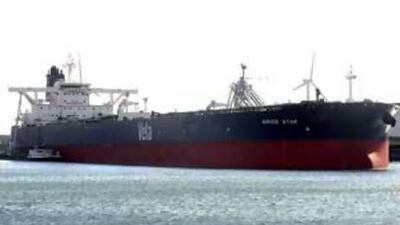MOGADISHU, SOMALIA // Pirates who seized a Saudi supertanker loaded with US$100 million in crude oil anchored the ship within sight of impoverished Somali fishing villages today, while the US and other naval forces decided against intervention for now. With few other options, shipowners in past piracy cases have ended up paying ransoms for their ships, cargos and crew. Nato said it would not divert any of its three warships from the Gulf of Aden and the US Navy's 5th Fleet also said it did not expect to send ships to try to intercept the MV Sirius Star. The tanker was seized over the weekend about 450 nautical miles off the Kenyan coast, the latest in a surge of pirate attacks this year. Never before have Somali pirates seized such a giant ship so far out to sea - and never a vessel so large. The captors of the Sirius Star anchored the ship, with a full load of 2 million barrels of oil and 25 crew members, close to a main pirate den on the Somali coast, Harardhere. Somalis on shore were stunned by the gigantic vessel - as long as an aircraft carrier at 329 metres. "As usual, I woke up at 3am and headed for the sea to fish, but I saw a very, very large ship anchored less than three miles off the shore," said Abdinur Haji, a fisherman in Harardhere. "I have been fishing here for three decades, but I have never seen a ship as big as this one," he said in a telephone interview. "There are dozens of spectators on shore trying to catch a glimpse of the large ship, which they can see with their naked eyes." He said two small boats floated out to the ship and 18 men - presumably other pirates - climbed aboard with a rope ladder. Spectators watched as a small boat carried food and qat, a narcotic leaf popular in Somalia, to the supertanker. The Saudi foreign minister Prince Saud al Faisal called the hijacking "an outrageous act" and said "piracy, like terrorism, is a disease which is against everybody, and everybody must address it together". Speaking during a visit to Athens today, he said Saudi Arabia would join an international initiative against piracy in the Red Sea area, where more than 80 pirate attacks have taken place this year. He did not elaborate on what steps the kingdom would take to better protect its vital oil tankers. Saudi Arabia's French-equipped navy has 18,000-20,000 personnel, but has never taken part in any high-seas fighting. Abdullkadir Musa, the deputy sea port minister in northern Somalia's breakaway Puntland region, said if the ship tries to anchor anywhere near Eyl - where the US said it was heading - then his forces will try to rescue it. Forces from Puntland have confronted pirates off the coast, though Somalia's weak central government, which is fighting Islamic insurgents, has been unable to mount a response to increasing piracy. Puntland forces, their guns blazing, freed a Panama-flagged cargo ship from pirates on Oct 14. The gun battle killed one soldier and injured three others. No hostages or pirates were hurt. The Dubai-based owner of the Saudi tanker Vela International Marine Ltd said the oil tanker's crew "are believed to be safe". The crew consists of 19 Philippines nationals, two British, two Polish, one Croatian and one Saudi national. The statement made no mention of a ransom or contacts with the bandits, but such companies have little choice but to pay out huge ransoms, usually totalling around $1 million, to ensure the safety of the crew and the vessel's return. The Sirius Star's cargo is worth about $100 million at current prices, but the pirates have no known way to unload it from the tanker and there are no oil refineries in Somalia. In Vienna, Ehsan Ul-Haq, chief analyst at JBC Energy, said the seizure was not affecting oil prices, since traders are focused instead on "the overall economy". The latest in a surge of pirate hijackings highlighted the vulnerability of even very large ships and the inability of naval forces to intervene once bandits are on board. The US Navy's 5th Fleet said today it was monitoring the situation but didn't expect to send warships to surround the vessel as it has done with a Ukrainian ship loaded with tanks and other weaponry seized Sept 25 off the Somali coast. That ship remains in pirate hands but the US is making sure those weapons are not taken off the ship. In Somalia, pirates are better-funded, better-organised and better-armed than one might imagine in a country that has been in tatters for nearly two decades. They have the support of their communities and rogue members of the government - some pirates even promise to put ransom money toward building roads and schools. Often dressed in military fatigues, pirates travel in open skiffs with outboard engines, working with larger ships that tow them far out to sea. They use satellite navigational and communications equipment and an intimate knowledge of local waters, clambering aboard commercial vessels with ladders and grappling hooks. They are typically armed with automatic weapons, anti-tank rocket launchers and grenades - weaponry that is readily available throughout Somalia. *AP

Hijacked oil tanker anchors off Somalia
Pirates who seized a Saudi supertanker loaded with US$100 million in crude oil anchor the ship within sight of impoverished Somali fishing villages.
Most popular today
